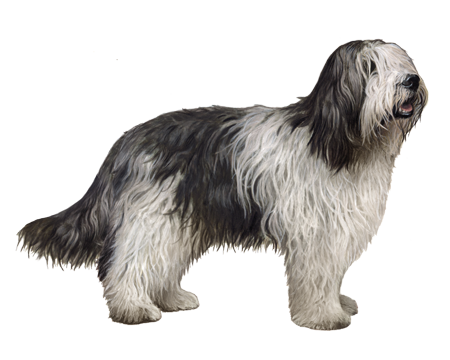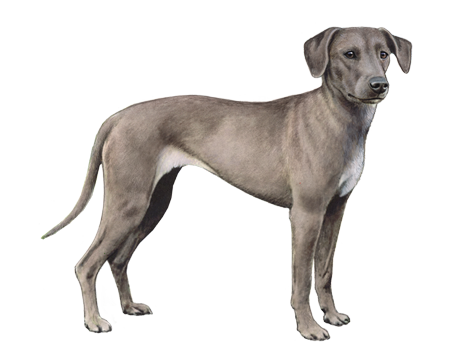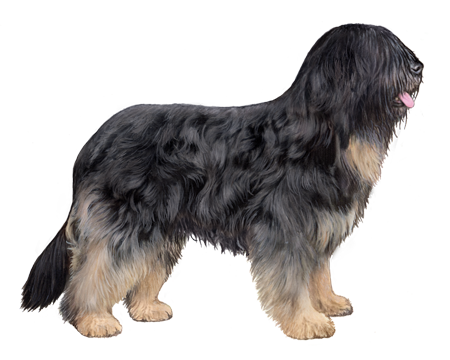
Schapendoes
The “shaggy sheepdog of Holland” is a friendly, affectionate, cheery dog that excels as a pet for active families looking for a spirited companion.
Interested in discovering if your dog is a Schapendoes?
Check out Wisdom Panel's DNA tests.

Schapendoes Traits
General Appearance
Schapendoes are medium-sized dogs with long coats, effortless movements, and open-minded expressions.
Coat and Coloring
These double-coated dogs have sufficient undercoats and long, slightly wavy overcoats with fine, dry hair.
On the hindquarters, their coats can be two-and-a-half inches long (or longer) and stand in tufts, giving Schapendoes the appearance of a large girth. Schapendoes also have large top knots, mustaches, and beards.
The breed standard permits all colors, but it prefers for Schapendoes with blue-grey to black coloring.
Distinctive Physical Traits
Schapendoes have fine-boned bodies that are slightly more long than tall. These dogs have deep chests, muscular hocks, and strong necks. Their large, broad feet with tightly bunched toes and thick, springy pads allow Schapendoes to move with a light-footed gallop.
Schapendoes also have high-set ears that hang free and large, round eyes with a lively, honest expression.
Schapendoes Temperament
Schapendoes are herding dogs that moved flocks between pastures. The job required attentiveness and courage—traits that remain hallmarks of the breed; these are also characteristics that make Schapendoes excellent watchdogs.
With their families, Schapendoes are outgoing, high spirited, and friendly. They develop a strong sense of loyalty to their human packs and enjoy spending time together, especially outdoor activities.
But remember, these are herding dogs so they may attempt to corral children or other pets.


Schapendoes History
The breed, also known as Nederlandse Schapendoes, became a favorite of Dutch shepherds thanks to its speed and endurance. The Schapendoes is among the longhaired herding breeds related to the Polish Lowland Sheepdog, Bergamasco, Old German Sheepdog, and Bearded Collie.
Known as a “dog of the common people,” neither art nor literature featured the Schapendoes, and the breed remained little known outside of Holland. Even in their home country, the Border Collie often overshadowed the native breed, and their numbers dwindled.
Like other European herding dogs, the Schapendoes almost disappeared during World War II. However, P.M.C. Toepoel, a founder of the breed, helped restore flagging populations. A national breed club formed in 1954 and created a breed standard for the Schapendoes.
The number of registered dogs has since increased but remains small to this day.
Schapendoes Care
Nutrition
Feed Schapendoes a high-quality dog food that is appropriate for their life stage (puppy, adult, senior). Portion out their food with a measuring cup and limit treats to no more than 10 percent of their daily calories to avoid overfeeding.
Grooming
Although the Schapendoes has long hair, their grooming needs are minimal. An occasional bath and weekly brushing are all it takes to keep their hair free of mats, tangles, and debris.
Schapendoes also benefit from a regular dental care routine that includes at-home teeth brushing and professional cleanings.
Exercise
The Schapendoes is an active breed that relied on endurance and speed to herd their flocks; thus, they need regular exercise to be healthy, happy pets.
In addition to regular walks, swimming, hiking, and trips to the dog park, Schapendoes also do well in dog sports such as obedience, agility, and rally. Games of fetch in a fenced yard can also help Schapendoes burn off some of their abundant energy.
Schapendoes are extraordinary jumpers and could easily clear a fence, so it's essential to supervise them during outdoor activities.
Training
Schapendoes are both intelligent and independent, which means they're quick learners but may need some incentive to stick with their training. Keep training sessions short and upbeat and use motivational tools such as treats and favorite toys to help Schapendoes master basic commands and learn new tricks.
Socialization is important for all breeds, including Schapendoes. Start early, exposing these dogs to new people, pets, and places to help them mature into well-adjusted pets.

Schapendoes Genetic Health Conditions
-
Chondrodystrophy (CDDY) and Intervertebral Disc Disease (IVDD) Risk
Chondrodystrophy (CDDY) is a skeletal disorder characterized by shortened limbs and abnormal early degeneration of the spinal discs, or intervertebral disc disease (IVDD), which predisposes to disc herniation.
-
Generalized Progressive Retinal Atrophy (Discovered in the Schapendoes)
Generalized progressive retinal atrophy (GPRA) is an eye disorder where the light sensing retina at the back of the eye degenerates, causing progressive vision loss and eventual blindness.
-
Hyperuricosuria
Hyperuricosuria (HUU) is a condition that predisposes affected dogs to the formation of urinary stones, such as kidney or bladder stones.
Knowing if your Schapendoes is a carrier or at-risk for these conditions can help you and your veterinarian plan for your pup’s lifelong care. With Wisdom Panel™ Premium, you can get results for over 200 genetic health tests.
Breed Group
Herding
The herding group is a diverse category. These highly intelligent breeds were developed to guard and control the movement of livestock.
Resources
https://www.akc.org/dog-breeds/schapendoes/
http://www.fci.be/Nomenclature/Standards/313g01-en.pdf
http://schapendoesclub.ca/health/introduction-2/
Reviewed July 26, 2020 by Cindy Elston, DVM, MPH





































































